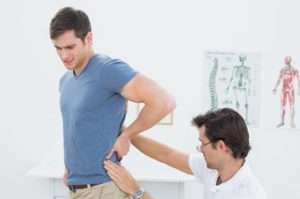 The vertebrae of the spinal column are separated by discs made of cartilage. Each disc has a strong outer layer and a softer inner part that acts as a shock absorber to cushion the vertebrae during movement. If the disc is injured, or sometimes as a normal part of aging, the inner part of the disc can bulge or rupture through the outer layer (herniated disc). The ruptured inner part of the disc can compress or irritate a nerve root and may even injure it.
The vertebrae of the spinal column are separated by discs made of cartilage. Each disc has a strong outer layer and a softer inner part that acts as a shock absorber to cushion the vertebrae during movement. If the disc is injured, or sometimes as a normal part of aging, the inner part of the disc can bulge or rupture through the outer layer (herniated disc). The ruptured inner part of the disc can compress or irritate a nerve root and may even injure it.
A ruptured disc may cause a person to experience pain, weakness or loss of sensation. The location of the herniation determines where the pain is felt. How badly the nerve root is compressed or damaged determines the severity of the pain.
Most ruptured discs are in the lower back and usually affect only one leg. Such a rupture causes pain in the low back and also down the sciatic nerve, which runs from the spinal column to the buttocks, leg, and heel. The sciatic nerve is the largest nerve in the body, which makes it highly susceptible to injury. The pain is referred to as sciatica. Other symptoms may include leg weakness, difficulty lifting the front part of the foot (foot drop) and irregular bowel or bladder function. Symptoms can be either constant or intermittent.
In an acute case where the nerve is severely compressed, surgical intervention may be indicated. Physical therapy techniques are effective in improving flexibility, increasing strength and most importantly, postural education and proper body mechanics. However, significant results are achieved by acupuncture through its ability to reach deep into the areas where inflammation and pain originate. Treatments combining acupuncture with physical therapy can promote a more rapid recovery.
Conditions Treated
-
- Bursitis
- Carpal Tunnel Syndrome
- Chronic Fatigue Syndrome
- Circulation
- Fibromyalgia
- Foot & Heel Pain
- Frozen Shoulder
- Herniated Disk
- Lower Back Pain
- Lumbar Spinal Stenosis
- Migraines
- Neck Pain
- Osteoarthritis
- Peripheral Neuropathology
- Piriformis Syndrome
- Poor Posture
- Rheumatoid Arthritis
- Rotator Cuff
- Sciatica
- Shingles
- Sinusitis
- Tennis Elbow
- TMJ